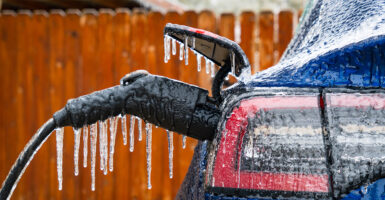In the lot of Eau Claire, Wisconsin’s, local Ford dealership, dominated by an impressive lineup of F-150 pickup trucks and SUVs, I asked the salesman, Joe, about buying an electric vehicle. It turns out that not many EVs are sold in Eau Claire.
Joe told me that he typically sells about one or two electric vehicles for every 100 gasoline-powered cars. Since there were only a couple EVs he could point to on the lot, we went inside to see an electric sedan, a 2023 Ford Mach E.
It was far more than I could afford, but I inquired about how it performs. Joe said it can take over 40 hours to charge with a standard 120V three-prong wall outlet. Upgrading to a faster charger, the 240V outlet, is costly and requires new electrical wiring to the garage in most cases. This can be difficult or impossible for people who have old homes, rent their homes, or simply can’t afford it.
The car’s advertised range of just 250 miles doesn’t account for driving with the heat on, which reduces the range. While the Midwest had a mild start to the winter season, evading the cold altogether is an elusive endeavor in Eau Claire. Temperatures are expected to struggle to rise above zero degrees Fahrenheit this week, and battery-powered vehicles lose up to 40% of their range in the cold. When the wind chill is 30 degrees below zero, you can bet every car has the heat on as hot as it goes. It’s no surprise that Joe hardly sells any EVs.
When deciding on a vehicle to purchase, Joe suggested considering the environmental implications of driving the vehicle. It’s overly optimistic to assume that the environmental advantages of electric vehicles will outweigh their practical drawbacks. Driving an EV instead of a gasoline-powered car has no discernible effect on the climate.
While electric vehicles do not emit carbon dioxide during operation, they depend on fossil fuels for the electricity needed to charge their batteries, particularly in Wisconsin. With an average of barely three hours of direct sunlight per day in winter, solar power plummets to a third of the summertime capacity (and that’s when the panels aren’t covered in snow).
Additionally, manufacturing an EV emits nearly twice the amount of carbon dioxide compared to manufacturing a gasoline vehicle, and mining for battery components has other environmentally damaging effects.
All of the car, truck, train, and plane emissions in America account for about 3.9% of global carbon emissions. Even if America abandoned all fossil fuels overnight, it would hardly affect our climate.
Kevin Dayaratna, chief statistician at The Heritage Foundation, used government models to show that completely eliminating all fossil fuels from the United States would yield less than a 0.2 degree Celsius reduction in temperature by the year 2100. There may be reasons to purchase an EV, but saving the environment is not a good one. (The Daily Signal is the media outlet of The Heritage Foundation.)
While China’s carbon emissions are more than double those in America, President Joe Biden wants Americans to foot the bill for reducing the world’s carbon. Going all-in on electric vehicles means our capacity to supply electricity must necessarily skyrocket.
In return, Americans will get higher electricity bills, a further reliance on China, and no environmental benefits. Biden’s goal of mandating that 60% of new vehicles are electric by 2030 will increase the cost of energy—disproportionately hurting the poor. According to last month’s special report from The Heritage Foundation on affordable and reliable energy, access to affordable energy directly influences access to safe water, health care, food, and cleaner environments.
Biden should leave car-purchasing decisions to individuals and not force them to buy EVs. If electric vehicles surpass gasoline vehicles in functionality or affordability, government subsidies and tax incentives would be unnecessary. People didn’t need tax credits for kerosene when they transitioned from using whale oil for lamps. They bought it because it was more efficient and it burned brighter.
While my trip to the dealership did not end with my joining the 0.1% of Wisconsinites who own an electric vehicle, maybe I’ll consider one when they can outperform gasoline-powered SUVs during a subzero January in Wisconsin.
Have an opinion about this article? To sound off, please email letters@DailySignal.com, and we’ll consider publishing your edited remarks in our regular “We Hear You” feature. Remember to include the URL or headline of the article plus your name and town and/or state.

























